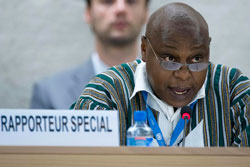
In the framework of the 32nd Session of the Human Rights Council, the UN Special Rapporteur on the rights to freedoms of peaceful assembly and of association, Maina Kiai, published a report in which he focused on fundamentalism and extremism which threaten the right of individuals to peaceful gathering and association.
The report which was issued in (7 June 2016), and submitted to the Human Rights Council in (17 June 2016), pointed out that fundamentalism includes all movements that advocate strict and literal adherence to a set of basic beliefs and principles, including the religious, political, cultural and commercial fundamentalism.
Kiai stated in the report that the danger lies in the fact that the owners of these believes seek to impose them through restricting the rights of others who have different views and backgrounds, thus threatening the values of pluralism and the essence of democracy, and violating the individuals’ right to the freedom of peaceful gathering and organization.
The report pointed out to the phenomenon of extremism clarifying that depriving people of peaceful and legal participation contributes in increasing anger and despair, thus rising extremism and violence.
The UN Special Rapporteur emphasized in his report that the suppression of the right to freedom of peaceful assembly and of association is being exercised by the authoritarian regimes where the political power is concentrated in the hands of one person or one family, and it may often be hereditary. The report clarified that Saudi Arabia is an example of exercising religious and political fundamentalism, since it bans the formation of political parties and its law classifies many political acts as crimes, including breaking allegiance to the ruler, and trying to defame the state’s reputation. It also stressed that many activists and organizations that have criticized the government were subjected to imprisonment and harassment.
The report indicated that the Saudi government is excising religious fundamentalism, where it imposes severe restrictions on the practice of the religious rituals which are different from the Wahhabi rituals, clarifying that non-Muslims are prohibited from worshipping in public places, and exercising their rituals in secret is not fully safe. He pointed out that Saudi Arabia imposes death penalty on religious opinions, in which the law considers many acts as crimes such as apostasy. The report stressed that Saudi Arabia uses such crimes against the activists who criticize the state’s policy, and classifies atheism or questioning the religious fundamentals within the terrorist acts.
The Special Rapporteur concluded his report with a number of recommendations to the member States in the Human Rights Council, including urging the ratification of all international human rights instruments that protect the right to freedom of peaceful assembly and of association, and guarantee that no individual is being subjected to harassments and persecution due to exercising these rights.
Although Saudi Arabia is a member in the Human Rights Council, it has not yet abided by many international treaties and conventions, including the International Convention on Civil and Political Rights (ICCPR) as well as the International Convention on Economic, Social and Cultural Rights (ICESCR).
